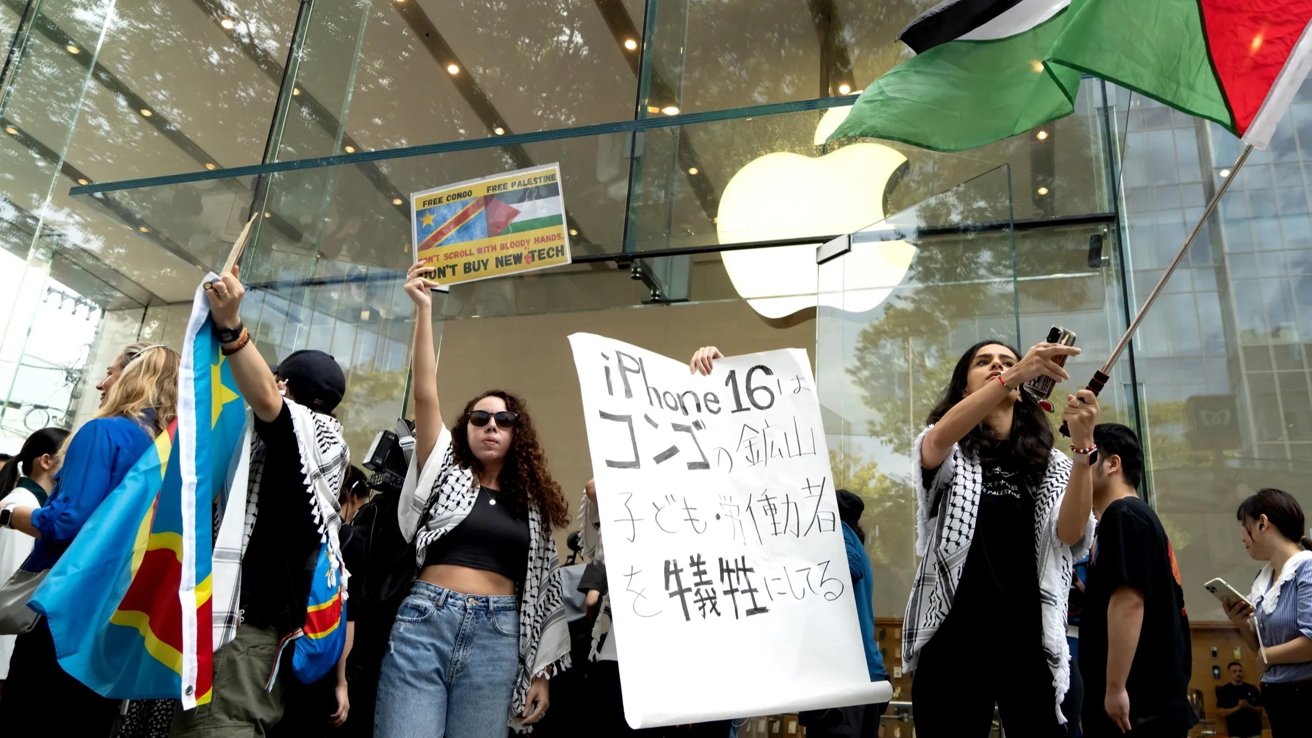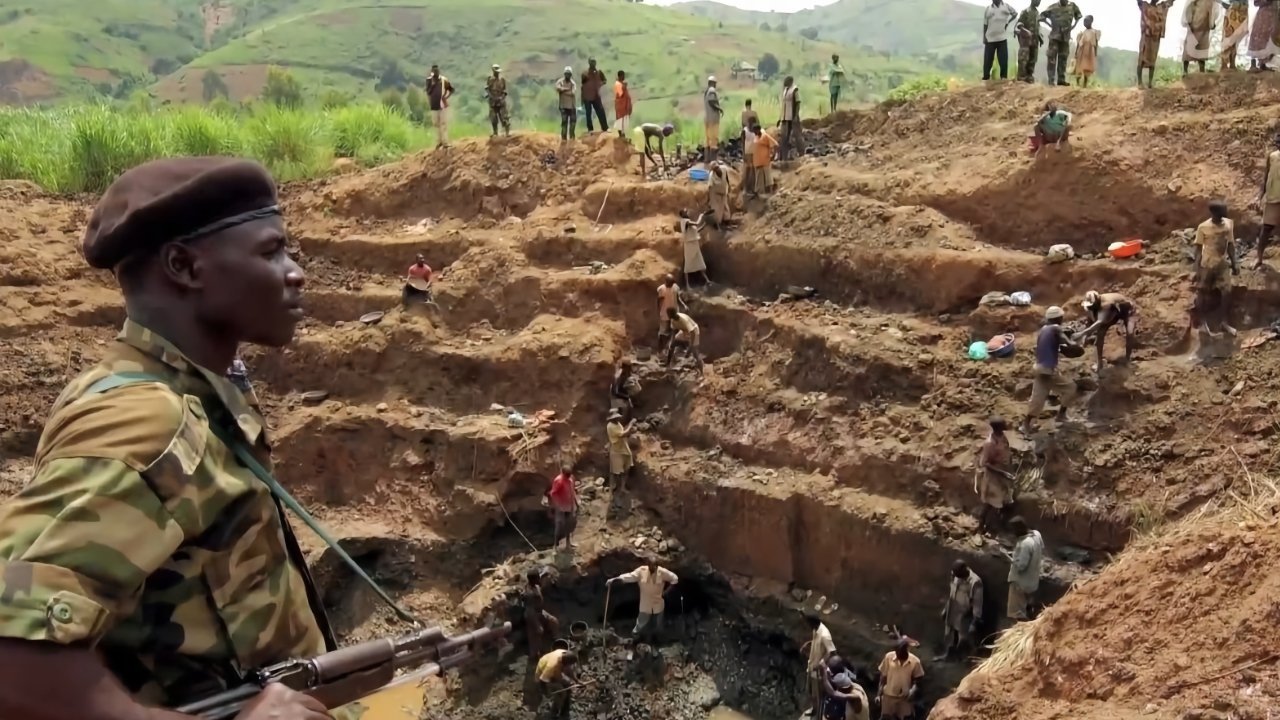Protests at Apple Stores in multiple cities mar iPhone 16 launch
Demonstrators in a dozen cities in the US and other countries took advantage of the publicity of the iPhone 16 launch to call for a boycott of Apple products. The protests included some current and former Apple employees.

Protesters encourage Apple boycott in front of a store in Tokyo. Photo: Tomohiro Onsumi
The new demonstrations at Apple Stores centered around accusations of ignoring violence in both the Democratic Republic of Congo in Africa, as well as the ongoing hostilities between Gaza and Israel.
The protesters accuse Apple of being complicit in the humanitarian crises in both conflict zones. A protester identified as "Lucy" by the Bristol Post news site was quoted as saying they were protesting "against Apple's complicity in the Congelese and Palestinian genocides."
Apple gets gold, along with a group of minerals collectively called "3T" -- tantalum, tin, and tungsten -- from the Congo for use in iPhones. International groups say while Apple ended some relationships with smelters and refiners in the Congo in 2019, it continues to get raw and finished materials from other suppliers there.
Apple's involvement in Israel includes owning the second-largest research and development center in the country, which has been in operation since at least 2015. This follows a letter from some 300 Apple employees in April 2024 calling on the company to do more for the Palestinian community.
Protesters accuse Apple of complicty
Lucy noted that in Congo, "militia backed by Uganda and Rwanda steal coltan and are killing [and] raping people, and are enslaving men, women, and children to mine the coltan in dangerous conditions. Apple buys this coltan." The Democratic Republic of Congo has been embroiled in armed conflict against rebels backed by Rwanda since the 1990s.

Apple gets materials used in the iPhone and other products from war-torn Congo.
Another protester identified as "Soraya" noted in April 2024 that Apple has remained silent on the war in Gaza, despite pressure from some of its own employees. Soraya noted that in October 2023, CEO Tim Cook had said that his "heart goes out to the victims," but there had been no further comment since.
More, in November 2023, Apple briefly paused Slack channels used by, respectively, Jewish and Muslim employees. It was subsequently claimed by protesters that Apple had in fact shut down the Slack channel used by Muslim employees.
Then in April 2024, an Apple Store in the Chicago area reportedly fired an employee for wearing a keffiyeh, a traditional Palestinian garment. This resulted in protest in front of the Lincoln Park Apple Store in Chicago, organized by a group calling itself Apples4Ceasefire.
The protesters outside Apple Stores for the iPhone 16 launch are calling for consumers to boycott Apple products, and unsubscribe from services such as iCloud+ and Apple Music in protest.
Read on AppleInsider

Comments
YOU DONT WANT ISRAEL COMING AFTER YOU? Don’t murder, torture, and abuse their women, children and pets - civilians.
Protesting Apple is what led to the 100% green Apple we have today, used to make giant plastic products, they are even striving to make all their products 100% carbon free. I think they'll survive a little protest. No one is thinking we need to dismantle them, just course correct.
Putin is ugly, but don't forget our own magamaniacle leaders acting like 14yo's
YOU DONT WANT [Hamas] COMING AFTER YOU? Don’t murder, torture, and abuse their women, children and pets - civilians.
If you look closely at the main photo in the article, and then if you Google up more photos of the protestors, you will find that the vast majority are not Japanese (and not even Asian). That matters. A lot.
Japan is between 97.4 to 98.5% native born Japanese (depending on which stats you choose). And while there are more foreigners in Tokyo compared to central Japan where I reside, the fact remains that foreigners are still a teensy tiny percentage of the overall population. As such, those protestors at the Tokyo store may have been called in from overseas just to do the protest, just as many protestors on American college campuses have been called in from the outside.
Even if some of those Tokyo Apple store protestors happen to live in Japan (most likely for a very short time though), they risk giving "gaijin" people a bad name in the eyes of Japanese people. That would be different if half or most of the protestors were visibly Japanese, but again, that wasn't the case. Although Japanese people are extremely welcoming to non-Japanese people, there is a tendency to view them as being ignorant of Japanese ways (which is often true). And it really is the way of Japan to avoid confrontation, which is why native born Japanese people tend to avoid protesting in general, especially when compared to the amount and type of protesting done in other countries.
So the protests in Tokyo would seem to have been staged as a part of a larger global set of protests, done in order to garner the attention of the mass media, in part to hurt America's home grown success stories like Apple, but also in part to be a Pro Palestinian mouthpiece for hate, insofar as most of these pro Palestine groups are doing the bidding of Hamas, which not only is a terrorist organization, but which also calls for the "destruction" of Israel.
The biggest victory gained by protestors is when the mass media picks up the story.
Frankly, the only other practical solution is for someone to take over Congo and administer it in an ethical manner. But that would cause nearly as many problems as it solves, if not more. And increase the prices of those materials, with effects all the way up the chain.